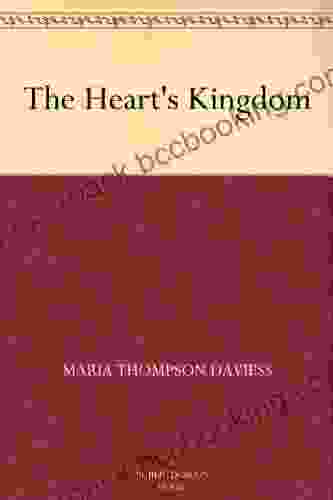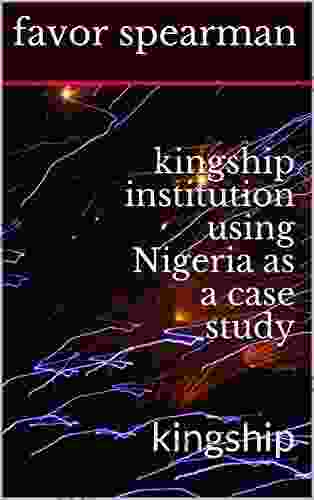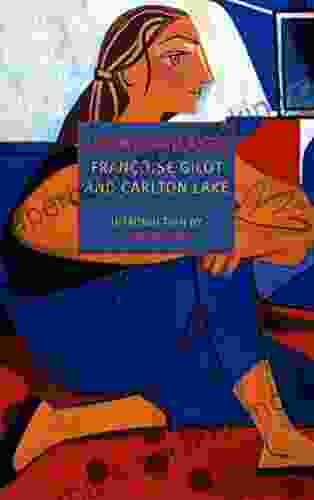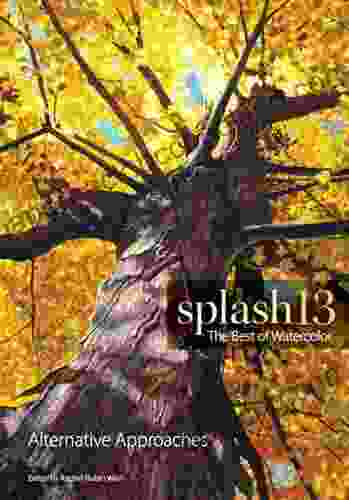The Kingship Institution in Nigeria: A Comprehensive Examination of Its History, Structure, and Challenges

The Kingship Institution is an integral part of Nigerian society, with roots deeply embedded in the nation's history and culture. Kings, known as Obas, Emirs, or Chiefs, have played a significant role in shaping the political, social, and cultural landscape of Nigeria for centuries. This article aims to provide a comprehensive examination of the Kingship Institution in Nigeria, exploring its historical evolution, structural dynamics, and the challenges it faces in the modern era.
5 out of 5
| Language | : | English |
| File size | : | 3095 KB |
| Text-to-Speech | : | Enabled |
| Screen Reader | : | Supported |
| Enhanced typesetting | : | Enabled |
| Word Wise | : | Enabled |
| Lending | : | Enabled |
| Print length | : | 83 pages |
Historical Evolution
The origins of the Kingship Institution in Nigeria can be traced back to pre-colonial times. In many ethnic groups, kingship emerged as a form of centralized leadership, where a single ruler held political and spiritual authority over a defined territory. The establishment of centralized monarchies varied across different ethnic groups, with some kingdoms developing earlier than others.
During the colonial period, the British authorities recognized and utilized the Kingship Institution as a means of indirect rule. Colonial administrators worked closely with traditional rulers, appointing them as warrant chiefs or native authorities to maintain Free Download and collect taxes. This resulted in a complex relationship between traditional rulers and the colonial government, which had a lasting impact on the institution.
After Nigeria gained independence in 1960, the Kingship Institution underwent significant changes. While the monarchy was retained in many parts of the country, its political powers were gradually reduced. The 1979 Constitution recognized traditional rulers as part of the local government system, but their role was primarily ceremonial and symbolic.
Structural Dynamics
The Kingship Institution in Nigeria exhibits a diverse range of structural characteristics. In some societies, such as the Yoruba, the monarchy is hereditary, with the new king selected from a specific royal lineage. In other societies, such as the Hausa, kings are elected by a council of elders or nobles.
The authority of a king varies depending on the ethnic group. In some cases, kings have considerable political and judicial powers, while in others, their role is primarily symbolic. Additionally, the relationship between the king and his subjects can vary, with some kings being revered as divine figures and others being seen as more accessible and approachable.
Functions and Significance
Traditionally, kings in Nigeria have played multiple roles within their communities. They have been responsible for maintaining law and Free Download, adjudicating disputes, and performing religious ceremonies. Kings have also served as custodians of cultural heritage, promoting traditional values and preserving historical traditions.
In contemporary Nigeria, the Kingship Institution continues to hold cultural and symbolic significance. Kings are often seen as guardians of tradition and guarantors of social stability. They play a role in community development, providing support and guidance to their subjects. Additionally, kings serve as ambassadors for their communities, promoting cultural understanding and fostering unity.
Challenges and Controversies
Despite its enduring significance, the Kingship Institution in Nigeria faces a number of challenges in the modern era. One of the most pressing challenges is the issue of legitimacy. In some cases, the selection and installation of kings have been marred by allegations of corruption, nepotism, and political interference. This has led to a loss of confidence in the institution and a decline in its authority.
Another challenge is the changing role of kings in a rapidly modernizing society. As Nigeria becomes more urbanized and Westernized, the traditional functions of kings are being eroded. This has led to some kings struggling to maintain their relevance and adapt to the changing demands of their communities.
Additionally, the Kingship Institution has been the subject of controversy regarding its role in governance. Some critics argue that traditional rulers are relics of the past and should have no place in modern governance. Others argue that kings can play a valuable role in promoting peace, unity, and cultural preservation.
The Kingship Institution in Nigeria is a complex and multifaceted institution that has played a significant role in shaping the nation's history and culture. Over the centuries, the institution has undergone numerous changes and adaptations, reflecting the evolving needs and aspirations of Nigerian society. While it faces challenges in the modern era, the Kingship Institution continues to hold cultural and symbolic significance, serving as a guardian of tradition and a guarantor of social stability.
As Nigeria continues to navigate its path in the 21st century, it is important to understand and appreciate the role of the Kingship Institution. By embracing both its historical roots and its potential for adaptation, Nigeria can ensure that the institution remains a vital part of its national identity and a source of unity and progress for generations to come.
5 out of 5
| Language | : | English |
| File size | : | 3095 KB |
| Text-to-Speech | : | Enabled |
| Screen Reader | : | Supported |
| Enhanced typesetting | : | Enabled |
| Word Wise | : | Enabled |
| Lending | : | Enabled |
| Print length | : | 83 pages |
Do you want to contribute by writing guest posts on this blog?
Please contact us and send us a resume of previous articles that you have written.
 Book
Book Novel
Novel Page
Page Chapter
Chapter Text
Text Story
Story Genre
Genre Reader
Reader Library
Library Paperback
Paperback E-book
E-book Magazine
Magazine Newspaper
Newspaper Paragraph
Paragraph Sentence
Sentence Bookmark
Bookmark Shelf
Shelf Glossary
Glossary Bibliography
Bibliography Foreword
Foreword Preface
Preface Synopsis
Synopsis Annotation
Annotation Footnote
Footnote Manuscript
Manuscript Scroll
Scroll Codex
Codex Tome
Tome Bestseller
Bestseller Classics
Classics Library card
Library card Narrative
Narrative Biography
Biography Autobiography
Autobiography Memoir
Memoir Reference
Reference Encyclopedia
Encyclopedia Suzanne I Barchers
Suzanne I Barchers Taylan Hoca
Taylan Hoca Lisa Campion
Lisa Campion Slow Sprint
Slow Sprint Sandra Swenson
Sandra Swenson Laurie Lisle
Laurie Lisle Richard Preston
Richard Preston Ruy Castro
Ruy Castro Rich Horton
Rich Horton Nigel Ward
Nigel Ward Stefan Jansen
Stefan Jansen Samra Habib
Samra Habib Tara Knudson
Tara Knudson Suzanne Carreiro
Suzanne Carreiro Marisa Renee Lee
Marisa Renee Lee Meera Kothand
Meera Kothand Lee Hadan
Lee Hadan Sabrina Hahn
Sabrina Hahn Patrick Tyler
Patrick Tyler Scott Nations
Scott Nations
Light bulbAdvertise smarter! Our strategic ad space ensures maximum exposure. Reserve your spot today!
 Fernando PessoaFollow ·8.3k
Fernando PessoaFollow ·8.3k Ron BlairFollow ·7.2k
Ron BlairFollow ·7.2k Clarence MitchellFollow ·4k
Clarence MitchellFollow ·4k Dennis HayesFollow ·11.6k
Dennis HayesFollow ·11.6k Quincy WardFollow ·12.8k
Quincy WardFollow ·12.8k Eugene PowellFollow ·5.6k
Eugene PowellFollow ·5.6k Mark MitchellFollow ·11.9k
Mark MitchellFollow ·11.9k Craig CarterFollow ·9.9k
Craig CarterFollow ·9.9k

 E.M. Forster
E.M. ForsterBluewater Walkabout: Into the Pacific
An Unforgettable...

 Joseph Foster
Joseph FosterUnlock the Secrets of Standardized Test Success with Test...
Are you tired of struggling with standardized...

 Joe Simmons
Joe SimmonsUnlock Learning with Flash Cards for Kindergarten:...
Ignite a Passion for...

 Raymond Parker
Raymond ParkerJourney into the Enchanting World of "The Heart Kingdom"...
A Timeless Tale of Love,...
5 out of 5
| Language | : | English |
| File size | : | 3095 KB |
| Text-to-Speech | : | Enabled |
| Screen Reader | : | Supported |
| Enhanced typesetting | : | Enabled |
| Word Wise | : | Enabled |
| Lending | : | Enabled |
| Print length | : | 83 pages |
















